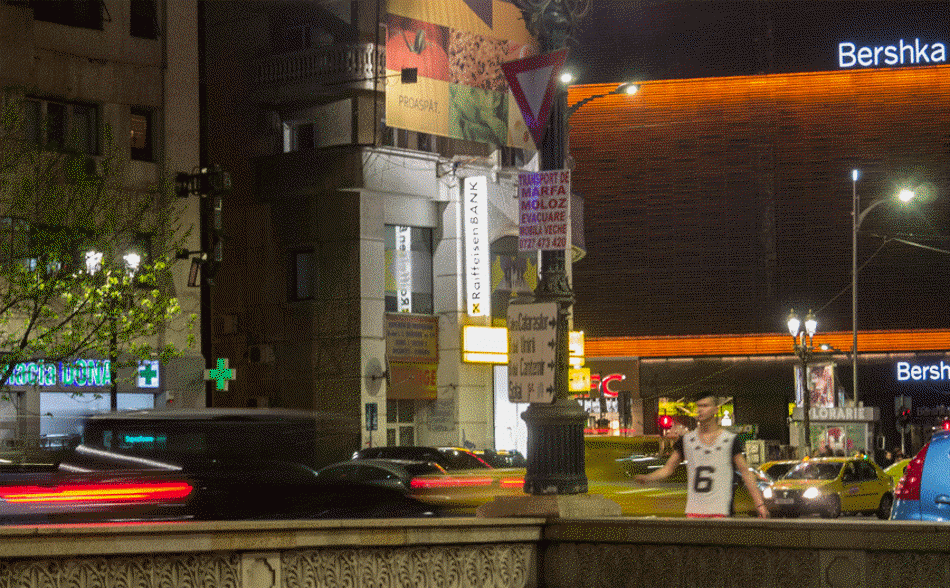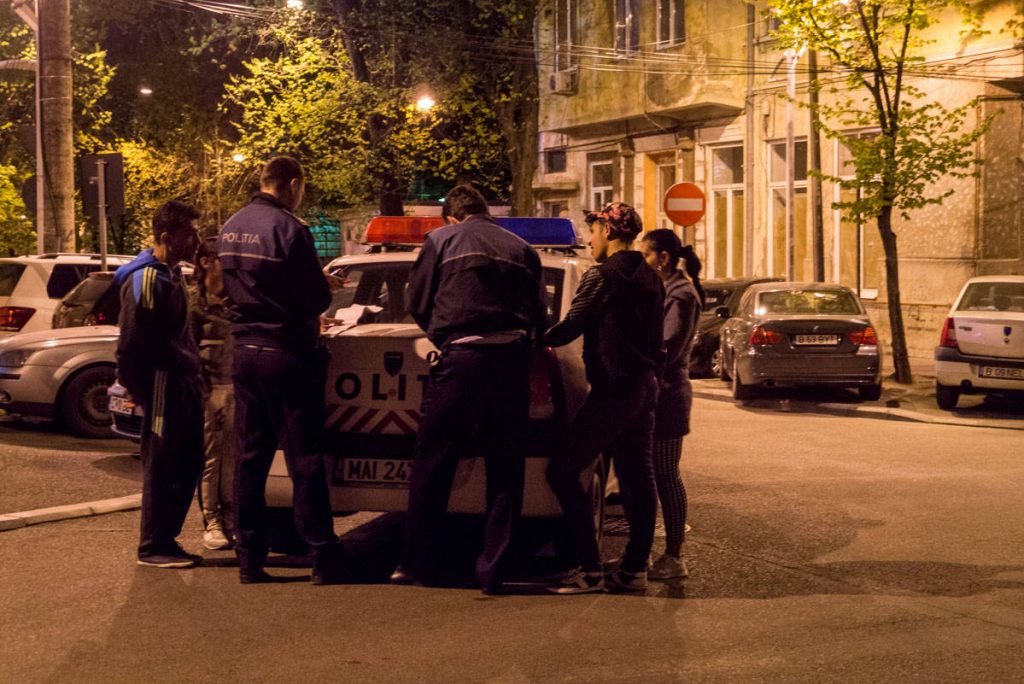The Hidden World of Car Parking Helpers

Each day between 7 and 8 a.m., 71-year-old Jan, his granddaughters Mari and Elena, who are in their 30s, and his great-grandchildren, aged 7 and 5, take to one street of the historic quarter in Bucharest, Romania. [1] [1] All names in this piece (other than the authors’) are pseudonyms. They spend hours directing drivers—with big arm swings and hand signals—to open parking spots. After the drivers park, Jan and his family members approach them deferentially and ask for donations. In the afternoon, Mari and Elena’s husbands take over the street and continue the work, catering to drivers until late at night. The street is busy day and night because of the booming pubs, shops, restaurants, and clubs in the area. The family of parking helpers works on the same street every day, seven days a week. When they are chased away by the police or stymied by new traffic regulations on “their” street or its sidewalk, they move to another street nearby.
This work provides Jan and his family—and many poor people like them—daily income. Working in two shifts, they earn about US$12 to $15 a day—enough to buy food, cigarettes, coffee, baby diapers, and occasionally a Coke or a beer. However, it’s not enough to cover rent for an apartment, so they squat in an abandoned building not far away. As with many poor people in Bucharest, Jan’s family receives no support from the local government.
With a budget of US$2.3 billion for 1.9 million residents, Bucharest is relatively rich compared to other cities in the European Union, and yet it lacks a functional social safety net, leaving the poorest of the poor to fend for themselves. The local government spends a substantial amount, however, on vehicle infrastructure—increasing the number of lanes, narrowing sidewalks, constructing new roads and overpasses, and converting undeveloped land into concrete or asphalt parking lots—in order to accommodate the city’s 1.2 million vehicles.
Anthropologists have traditionally focused their efforts on studying cars in motion—on traffic, not parking. We began our research on informal parking in Bucharest in 2008 when the number of parking attendants had increased noticeably, especially in traffic-ridden hotspots. Because one of us (Ioana) worked in a clothing and textile shop in the historic quarter and regularly witnessed Jan’s parking services, we befriended him and his crew. We worked to earn their trust, treating the family members with civility and providing them small favors. For instance, they could use the shop’s toilets or come in for shelter from the rain or snow; we gave them sample items for free and put them in touch with charities. In exchange, they shared their stories of street life.
Over the course of nearly four years, Ioana, who has a master’s in anthropology from the University of Bucharest, focused primarily on observing Jan’s crew and drivers’ reactions to them, while Liviu, a professor at the same institution, studied interactions between parking helpers and drivers in other parts of Bucharest. As we engaged with Jan, his family, and other parking attendants in Bucharest, we were struck by the level of disdain these people attracted from the media, drivers, and candidates in local electoral campaigns. Why, we wondered, do so many people in Bucharest have such vitriolic reactions to parking helpers?
Parking helpers like Jan and his crew are by no means unique to Romania. There are an estimated 1.2 billion automobiles on Earth. As the world’s cities become ever more car-choked, informal parking work serves as a source of small gains for individuals at the margins of many societies. Unofficial parking helpers are commonly found on the central streets of major cities in many countries. They are called franeleros in Mexico, flanelinhas in Brazil, and sayes in Egypt. They have counterparts in large cities in South Africa, Tanzania, Jamaica, Morocco, Portugal, China, Pakistan, Iran, Cuba, Indonesia, Italy, Thailand, Malaysia, the Republic of Georgia, Venezuela, the Philippines, and Spain.
In some places, such as Mexico City, parking help is deemed criminal, and municipal authorities crack down on workers, arresting them or shooing them away. But other places, such as South Africa, are more tolerant of informal parking, and workers have been able to gain some legal rights (although some police and security guards still extort money from them). In Pakistan, drivers trust parking attendants enough to hand over the keys and let them park their cars.
Little has been written (with the exception of scholarly accounts from South Africa) about car parking as a way of life, even though hundreds of thousands of poor people depend on it. And due to the lack of information, it is hard to explain the disparate attitudes across the globe toward parking attendants. We suspect that intolerance is more likely to occur in cities that seek to attract tourists and large events. Such cities want to look good and boost their global reputation, which may well mean they have a lower tolerance for visible spectacles of the poor.
In Bucharest, parking helpers are called parcagii. They do not garner much sympathy from most drivers, who call them “rats,” “mafia,” and “parasites”; they are often described on TV and the internet as “young men who do not want to work,” “enemy number one in our community,” and the like. The presence of parking helpers is widely considered a visible symbol of lawlessness and alleged police inefficiency. The Romanian media portrays their efforts as racketeering. One TV anchor blogged, “If there is room for a free parking spot in the area—you either give money [to parking helpers] or you keep on driving.” And then he concluded, sarcastically: “A true business—apart from paying taxes. Apart from my rights.” More sympathetic depictions of parking helpers have emerged recently—including a theater play that tells the story of an informal parking attendant who was killed inside a police station—but the overall tone is one of scorn and condemnation.
Car drivers want their parking to be free, and they don’t want to have to deal with members of a lower class. Self-appointed parking attendants threaten both those desires. In addition, some drivers feel physically intimidated by parking helpers and thus view them as extortionists. Stories abound that bolster this view, such as the urban legend that parking helpers will vandalize cars if they are not paid. One acquaintance of ours even started taking martial arts classes in order to help him fend off parking helpers should it be necessary.
Our research does not support the notion that parking helpers practice extortion. Jan, his extended family, and others like him do not use force, nor do they threaten drivers in any way. We never witnessed any car damage during our research. If anything, parking helpers seem to be guided by self-restraint in order to avoid attracting attention from the police. To help ease drivers’ concerns regarding safety, they usually request donations as the drivers move away from their cars. Addressing drivers with respectful words like “boss,” “chief,” “madam,” or “miss,” they offer short explanations for their requests; they say, for example, that they need money to buy food for their families or to buy medicine for their children, both of which are true.
Parking helpers reserve empty parking places each workday for a small number of regular clients—blocking them with plastic bottles, stones, or chairs. (They are not the only people who do this: Many drivers in Bucharest save parking spots for themselves.) Most drivers that parking helpers interact with, however, are casual customers. Approximately 1 in 3 of these drivers gives money. Those who refuse to pay often hurriedly exit their car, occasionally shouting, “Go get a job!” The most irritated drivers call the police.
The parking helpers’ work involves daily interactions with drivers, residents, and regular visitors of the historic quarter, which increases their chances of finding paid work as day laborers. One of Jan’s daughters secured a menial job as a cleaner for a judge. Another family member was hired as a dishwasher at a pizza restaurant. Others have scored seasonal construction work.
Occasionally, informal parking work may be a step toward a better life, as was the case with Albert Mpazayabo, a Rwandan refugee in South Africa who earned a master’s degree at the age of 51. For most people, like Jan, car parking means eking out a living and staying out of bigger trouble, like being sucked into the city’s drug trade and ending up in prison.
Critics might consider the impact on Bucharest of not having parking helpers. If Jan’s family members weren’t earning money, they would probably resort to panhandling on city sidewalks. If parking help disappeared, the city’s gridlock could worsen. Drivers would likely spend more time cruising for parking, which already accounts for some 30 percent of traffic, according to a 2007 article. Few drivers—much less city officials—acknowledge this positive outcome of the parking helpers’ services. We also witnessed the parking helpers pointing out when drivers left their lights on or their window open, or forgot their bags or purses in the car—a value-added service.
In many countries, the unconventional efforts of society’s destitute to make a living are often dismissed as non-work and parasitism. This is especially true for those whose work is located on sidewalks and streets. But parking helpers like Jan see their activities as work; they even have a common expression: “car sweating,” which refers to finding new, casual clients for “their” parking lots.
So why do so many people in Bucharest despise parking helpers? It’s true that many drivers consider them a nuisance, but that doesn’t explain the abusive language often used to describe them. One possible explanation is that many people are deeply uncomfortable being confronted by the most impoverished of our fellow humans. When we define other people as “parasites” and “rats,” it allows us to think of them as less than human, to blame them for their situation, and to turn society’s dispossessed into subhuman aggressors.
But from the perspective of the parking helpers, they are just people doing what they have to do to survive. And sometimes, on the good days, they even think of themselves as street-level entrepreneurs. For Jan and people like him, informal car parking, despite its challenges and risks, is a source of pride. As Mari said to Ioana once, after she had received some money from a driver, “I might be stupid, but hey, it turns out I know a thing or two after all!”




































